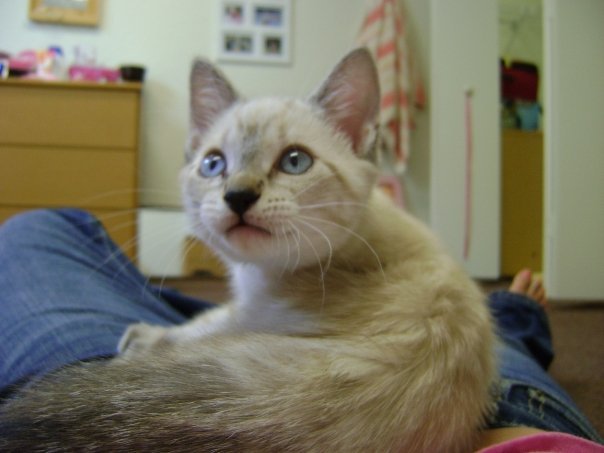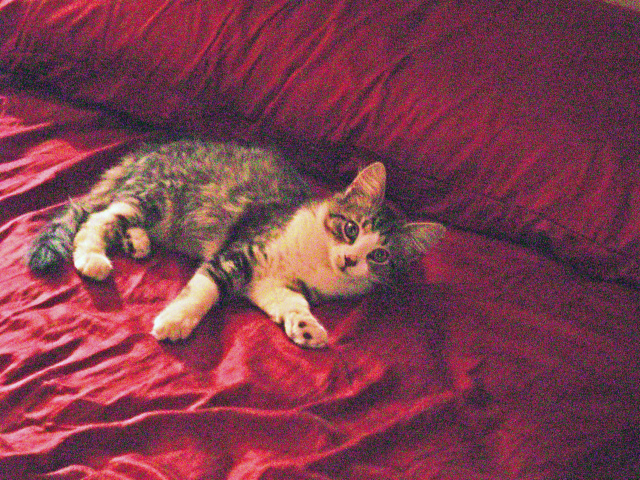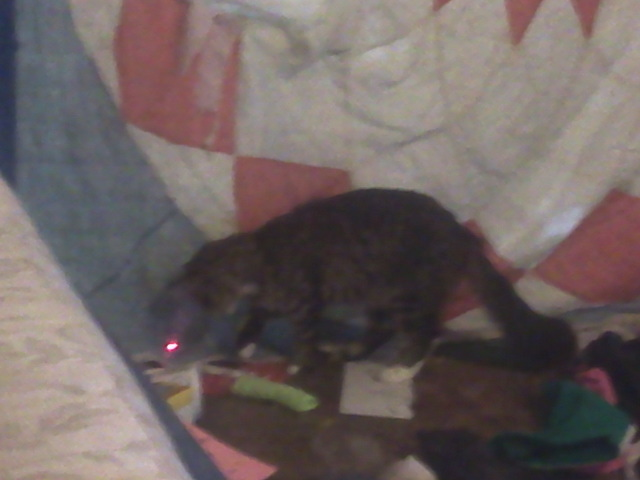QuestionHi, Kelly. We have two male Siamese rescues. Hershey is our 4-year old who's been with us for two years. Our previous second cat suddenly died at home (stroke my M.D. spouse diagnosed; was 15 years old) before the holidays -- Hershey seemed distraught when it happened -- and we went and got a new companion cat, Snickers, who's about 1 year old (much smaller than Hershey). (Photo of cats attached.)
Snickers is highly affectionate and so far has no fear of Hershey. However, Hershey rejected the idea of a new cat from the start (he was rescued from a 200+ cat hoarding and has always been around other cats). We kept Snickers in a separate room the first week, and Hershey seemed to pay no attention -- no paws under the doors, and when we would take Hershey into the room he would simply sit in one place and growl. Since New Year's we've given Snickers partial to full run of the condo; when he's loose Hershey retreats into hiding places -- for the past two weeks our cat condo tower. Typically he's been staying ithere all day, and seems to come out only in the middle of the night to eat or use the litterbox. I can remove him from the condo and place him on our bed or inside his cat bed on our sofa or kitchen island to be part of the action -- he'll stay there without moving, and will growl/hiss at Snickers whenever he comes to sniff or check out Hershey. There's at most one screaming cat fight per day that never lasts more than five seconds, and it usually happens so fast that I seldom see which cat attacks first. (Hershey has his claws, Snickers came to us declawed, but we haven't seen any blood or injuries to worry about.)
When I've tried locking Snickers in a separate room for the evening (with food and litterbox), Hershey may or may not come out to sleep with us. If I keep Snickers in a room by himself during the day, Hershey will eventually come out from the condo and act like his old self to a point.
It is totally unlike Hershey to be so fearful/territorial. I suppose we can go back to keeping Snickers in a separate room once again but I think Hershey will again totally ignore that room.
The rescue organization -- and my vet -- have suggested this is typical Siamese behavior and I should give it more time. I thought an opinion from a behavior specialist would help. Thanks!
AnswerHello Brent,
Firstly, I am sorry to hear about your other cat passing, it is always very upsetting to lose a companion and takes time to adjust to the loss, for yourself and Hershey.It has only been recently recognised that cats, like dogs, may also suffer from behavioural problems associated with the sudden departure of a housemate.
Although you say Hershey was rescued from a place where he lived with many cats, we cannot make the assumption that this means 'he lives comfortably with other cats'. The fact is that he more than likely had no choice but to live in this environment and probably found it extremely stressful. The fact that he lived well with your previous cat is not suprising. You need to remember that your previous cat was much older than him and therefore presented not much of a threat, also being taken from an enormous, stressful colony into a house where plenty of resources were available and there was now only one other cat would have been very appeasing to him.
Now your vet is correct in saying that one of the breed characteristics of the Siamese is that they are very devoted, and intelligent! But we must also remember that every cat has his or her own personality also. It is also interesting to add that when introducing a new cat into the household it may be made easier if the new cat is the opposite sex, and if one is younger than the other, for example, an 8yr old male being introduced to a 10 month old female. Some people will not agree that this makes any difference but there are certain statistics that support this claim.
It is vitally important that you provide each of your cats with their own faction in your home, a room that is their 'safe place', this room should have hiding places, food, water and toys provided. We say as a rule that there should be one litter tray per cat, plus one more, these should be placed in secluded private areas, one in each of their rooms if possible. Implementing these things will help in reducing any behavioural problems associated with competition for resources, which may just be what is happening here. Although we think our cats 'love' us or get 'jealous', these are human attributes that do not apply to them. The fact is that you are Hersheys source for all of his resources, food, water, latrines, play and attention. With another cat arriving, Hershey is probably feeling that this may be compramised. What I would suggest is not to try and force them together, by this I mean do not take Hershey to an area where your new cat is and visa-versa, by trying to get them to 'make friends' you are running the risk of causing more problems. If you see Hershey or your new cat begin to show aggressive behaviour towards the other, simply get their attention by redirecting them onto a game or their favourite toy. It will always take time for them to adjust and Hersheys actions are simply saying to the other cat 'I am top of the pecking order here, not you!', Hershey and your new cat should eventually meet a 'middle ground'. There is of course never any certainty as to whether they will ever live comfortably together, because as I said before each cat is very different and they will decide this for you. Two cats can live quite happily together for years and then decide to take a disliking to each other for reasons unknown. It is also true to say that Hershey may never 'take' to Snickers, but will quite happily live with a completely different cat! After doing all we can to make the introduction stress free and implementing the things I have mentioned and they still do not get along then we must accept that the two individuals are just not compatable. Give them a bit more time, distract them with games and treats and give them their own areas and see how you get along. If this still does'nt work then feel free to contact me again and I will give you some step by step behavioual modification techniques to try as the next step.
I hope this has helped you a little and good luck.
Thank you
Kelly

 2 sibling cats. one of the brothers just passed.
Question
Their last day togethe
how should i dea
2 sibling cats. one of the brothers just passed.
Question
Their last day togethe
how should i dea
 What kind of cat do i have?
Question
Chula
Ive been trying to figure out wha
What kind of cat do i have?
Question
Chula
Ive been trying to figure out wha
 Stray kitten
Question
My Kitten
Hi i was wondering how much t
Stray kitten
Question
My Kitten
Hi i was wondering how much t
 Additional info about the possbile norwegian
Question
Edmund at 4 months
I forgot to mention. Edmund
Additional info about the possbile norwegian
Question
Edmund at 4 months
I forgot to mention. Edmund
 dones my cat sweet pea look pregnant?
Question
sweet pea sweet pea nipples
Hi w
dones my cat sweet pea look pregnant?
Question
sweet pea sweet pea nipples
Hi w